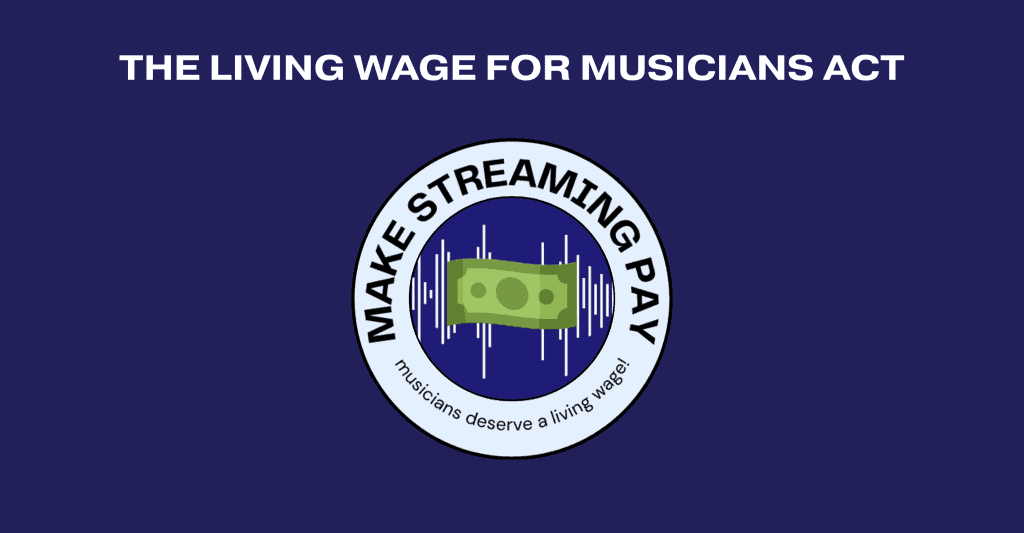U.S. Rep. Tlaib to Reintroduce The Living Wage for Musicians Act
United States Representative Rashida Tlaib of Michigan’s 12th Congressional District will reintroduce The Living Wage for Musicians Act (LWMA) in Congress for the second time on September 29th, 2025.

The Living Wage for Musicians Act (or LWMA), championed by US Representative Rashida Tlaib, and by former Rep. Jamaal Bowman, is being reintroduced in the new Congressional session on September 29th, 2025. This bill was originally proposed in the U.S. House of Representatives in 2024 as H.R. 7763.
Its stated goal is to create a minimum penny-per-stream royalty for artists by adding a fee to music streaming subscriptions and a 50% levy on non-subscription revenue. This new royalty would be paid into an Artist Compensation Royalty Fund to provide musicians with a more sustainable income.
The bill will return to Congress with renewed momentum, thanks to the backing of the United Musicians and Allied Workers (UMAW) and notable co-sponsors Reps. Ocasio-Cortez, Omar, Thompson, and Ramirez, and support from the NYC Council, who passed a resolution endorsing the bill’s call for fair streaming pay.
How the bill works
The main focus of the LWMA is to create a new royalty payment that is distributed to artists directly from streaming listens, rather than being routed through private companies. The inspiration behind this model can be found in the way SoundExchange currently collects and distributes royalties for satellite radio and internet broadcasting in the US.
Here are some features of the proposed model:
Creation of a New Royalty System — Establishment of an Artist Compensation Royalty Fund, a designated nonprofit entity approved by the Register and Librarian of Congress, to administer this fund.
New Funding Mechanisms — Streaming platforms must deposit into the fund:
- A new additional charge added to each subscriber’s streaming fee, equal to 50% of that subscription fee, but set no lower than $4 and no higher than $10.
- 10% of non-subscription revenue (like ad revenue) per calendar quarter.
- Potentially accepted contributions from other sources (federal, state, or local governments).
Distribution to Artists — 90% of the fund’s revenue goes to eligible featured artists based on their proportion of qualifying streams, while the remaining 10% goes to non-featured artists via payment to AFM & SAG-AFTRA’s IP Rights Distribution Fund (or successors). If an artist can’t be located, their payment is held in a trust and eventually returned to the fund if unclaimed.
Transparency & Oversight — Service providers must keep detailed records of subscription, non-subscription revenue, streams, and collection of the new royalty fee—retained for at least three years. The Fund Administrator would be able to audit service providers to ensure compliance.
Cap on Track Earnings — The introduction of a monthly cap on per-track royalty payouts (e.g., 1 million streams/month). Any royalties beyond that threshold are redistributed among all artists, supporting a broader base of creators.
Why does this matter for musicians?
As Tlaib says in the above video, “I’m from Motown, where our music has changed the world in so many incredible ways forever. But artists in my district and across our country are struggling to make ends meet in an industry where the money just keeps going to executives and shareholders.”
Streaming now accounts for around 84% of all recorded music revenue in the US — yet the majority of that value doesn’t reach artists until its been thinned out by all stakeholder parties first. This bill would add new dollars into the equation, and a direct payment system to allow for artists to earn a bigger piece of the pie.
Its also about creating a more equitable, sustainable environment to help support emerging artists. Under the LWMA, artists are guaranteed at least one cent per stream, with a monthly cap of 1 million streams per track. Beyond that threshold, any surplus is redistributed among creators — ensuring that mega-streamed hits don’t absorb all the funds — and that creative diversity is funded via revenue-sharing.
Why now?
Since the bill’s first introduction to Congress, the conversation around this topic has grown in the music industry, with scores of prominent artists and bands leaving platforms like Spotify due to a myriad of reasons. At the same time, calls to continue pursuing this legislation have gained in momentum from thousands of artists, industry workers, and participants in the live music space such as venues, promoters, and tour bookers, lending their support.
Reps. Ocasio-Cortez, Thompson, Omar, and Ramirez have signed on as co-sponsors, and this year, the New York City Council passed a resolution calling for fair pay in streaming and endorsing the LWMA. If you would like to support this bill yourself, you can write your congressional representative to request to cosponsor the bill.
Learn more about the LWMA here.